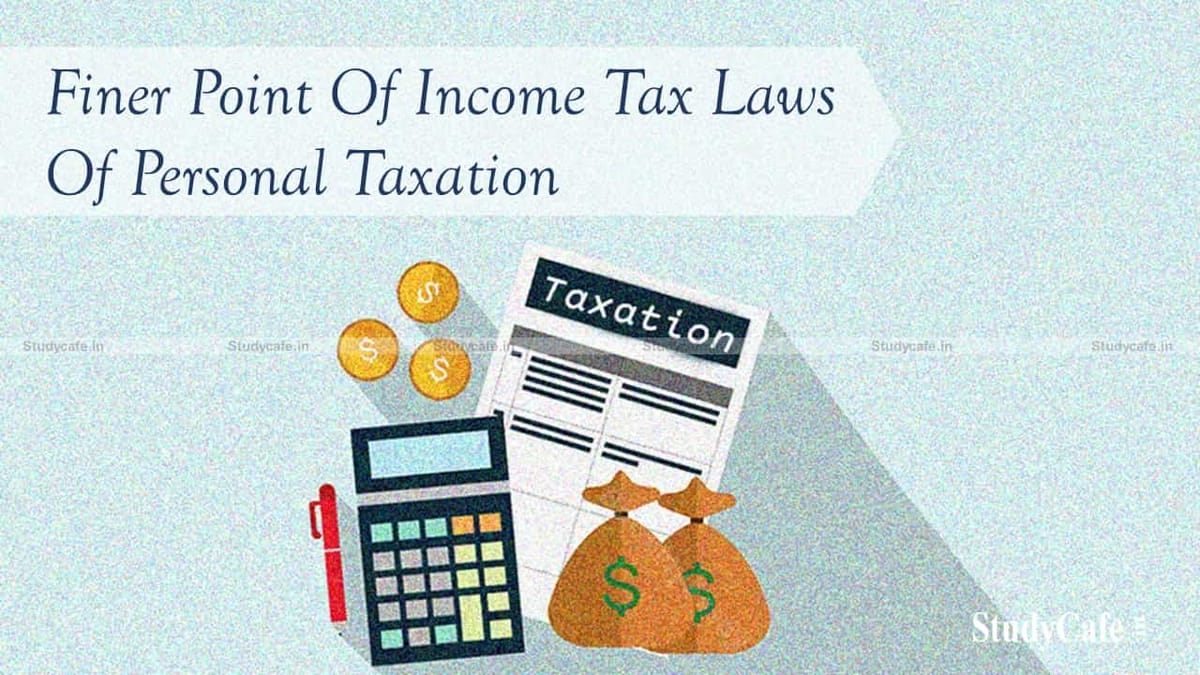Finer point of income tax laws of personal taxation one should be aware of
CA Balwant Jain | Oct 13, 2021 |

Finer point of income tax laws of personal taxation one should be aware of
Balwant Jain
There are certain provisions under the income tax laws which generally go unnoticed and have huge tax implications. Let us discuss.
The deduction in respect of life insurance premium is available for yourself, your spouse, and your children. You cannot claim it in respect of life insurance premium paid for your parents even if they are financially dependent on you. In contrast you can claim deduction for health insurance premium in respect for your parents even if they are financially not dependent on you. You can claim deduction for life insurance premium for children even if they are financially not dependent on you whereas the deduction in respect of health insurance for your children can only be claimed only for those children who are financially dependent on you. You can claim a deduction for life insurance premium even for your married son or a daughter. There is no restriction as to the number of children for which you can claim the tax benefits for health insurance as well as for life insurance unlike for education expenses and leave travel assistance (LTA) benefits which is available only for two children.
The tax benefit for home loan repayment under Section 80C is available only in respect home loan taken only for a residential house property whereas there is no such restriction for claiming deduction for interest under Section 24 (b) which is available for residential house as well as for commercial property. Likewise, deduction for principal repayment is available only if the loan has been taken from specified institutions and entities like banks, home finance companies, central and state governments, universities, public limited companies etc. whereas there is no such restriction as to the type of lender from whom you can borrow to claim deduction for interest paid. Even you can claim deduction for interest paid to friends and relatives provided you are able to establish the connection between the money borrowed and its ultimate use for the house.
The deduction for repayment under Section 80C is available only for construction or purchase of a house whereas the deduction for interest is available even for renovation, repair of the house property. If you sell or transfer the residential house within five years from the end of the financial year in which possession of the house was taken, the tax benefits availed for repayment of home loan under Section 80 C get reversed in the year in which you transfer your property and get taxed, there is not similar provision for reversal of tax benefits claimed under Section 24(b). In respect of an under construction property, interest paid during the construction period, called pre EMI can be claimed in five equal instalment beginning from the year in which you take possession, within the overall limits, whereas there is no such provision for deduction claimed in the past for principal amount repaid during construction period.
Holding of any capital asset beyond 36 months is generally the period prescribed for an asset to become long term but in case of land and building it is 24 months whereas shares listed in India and units of equity oriented scheme of Indian mutual funds is holding period requirement is only 12 months. The holding period requirement for shares not listed in India and shares is more than 24 months which includes shares of Indian companies as well as foreign companies. The units of equity schemes of foreign mutual fund are treated at part with units of debt fund for which the holding period requirement is more than 36 moths.
Long-term capital gains on the sale of listed equity shares and equity mutual funds are fully exempt upto one lakh every year and beyond that the same are taxed at flat rate of 10% without benefit of indexation. However, in case you sell these shares outside the stock exchange the same get taxed at flat 20% without any initial exemption but with the benefit of indexation available to you.
Normal short-term capital gains are taxed at the slab rate applicable to you, but tax on short-term capital gains on the sale of listed shares through a stock broker and on equity oriented schemes is taxed flat @ 15% irrespective of your slab rate. So in case you are in the 10% tax slab, you may still have to pay short-term capital gains tax @ 15% on the listed shares sold on the recognised stock exchange.
I am sure this discuss will be helpful for you in taking financial decisions which have tax implications.
Balwant Jain is a tax and investment expert and can be reached on [email protected] and @jainbalwant on twitter.
In case of any Doubt regarding Membership you can mail us at [email protected]
Join Studycafe's WhatsApp Group or Telegram Channel for Latest Updates on Government Job, Sarkari Naukri, Private Jobs, Income Tax, GST, Companies Act, Judgements and CA, CS, ICWA, and MUCH MORE!"